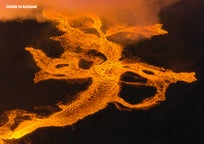
Icelandic Proverbs & Sayings
- Icelandic Proverbs
- No one becomes a bishop unbeaten
- Coin turns many into monkeys
- A bad rower blames the oar
- Plight teaches a naked woman to spin
- Everyone has their devil to drag
- Distance makes the mountains blue
- Icelandic Sayings
- To not call everything grandma
- Foot and webbings were up in the air
- May all dead fleas now drop from my head
- To sit on something like a wyrm on gold
- To strike someone with golden hammers
- To lay beneath furs
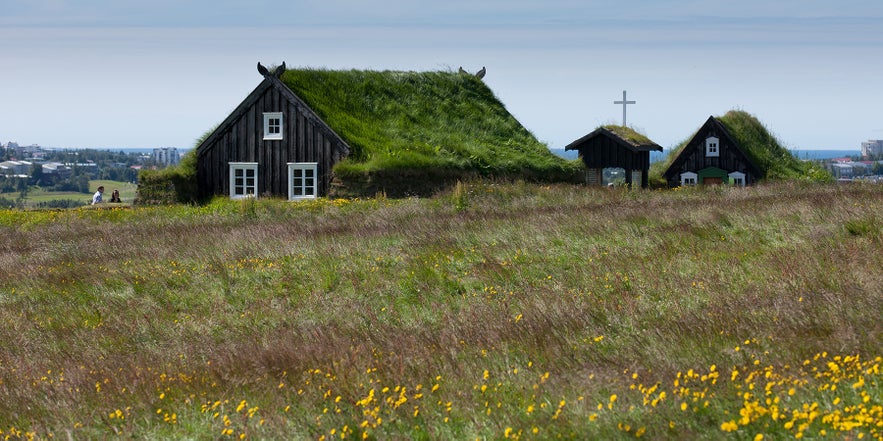
Iceland has always been, and remains, a literary nation. In years past, people would entertain the household through the long evenings by telling stories and reading books to each other. Throughout the centuries, some phrases and sayings have captured the spirit of something so well that they've entered the daily lexicon of people. In some cases, the exact origins of the phrase might be shrouded in mystery, but that doesn't mean they're any less profound.
In this article, we have gathered just a few of the many commonly used proverbs and sayings in Iceland. Some of these phrases are older than others, but they all have it in common that they are still being used today.
If you want to get an insight into the history of Iceland, book a hotel in Reykjavik and explore the many fascinating culture tours that are available. If you want to explore the rest of the country, we recommend renting a car or going on a self-drive tour around Iceland for an unforgettable trip.
Icelandic Proverbs
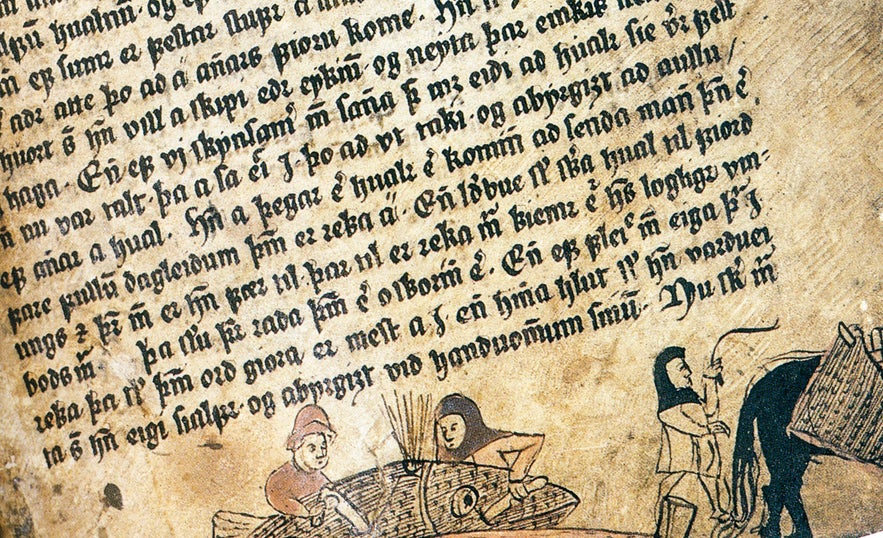 We have gathered some of our favorite proverbs that are commonly used in daily parlance. In this case, a proverb means a precise, well-known saying that states a general truth or a piece of advice in the form of a metaphor. Following the proverb is an explanation of its meaning and where it originates from.
We have gathered some of our favorite proverbs that are commonly used in daily parlance. In this case, a proverb means a precise, well-known saying that states a general truth or a piece of advice in the form of a metaphor. Following the proverb is an explanation of its meaning and where it originates from.
No one becomes a bishop unbeaten
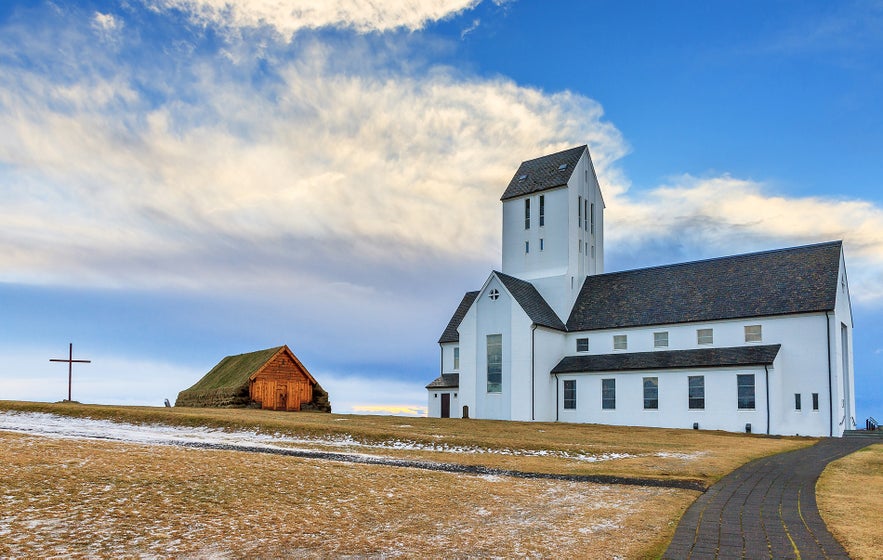
The church at Skalholt, where the Bishop of Iceland has resided since 1056.
"Enginn verður óbarinn biskup" is a popular Icelandic proverb that has deep roots in Icelandic history. For centuries, the most powerful public office an Icelander could hold was being a bishop, when Iceland was part of kingdoms in Scandinavia (first Norway, then Denmark). Therefore, to become a bishop, one would have to face a lot of adversity, betrayals, competition, and everything else associated with rising to a high position.
Simply put, you won't become bishop without offering the other cheek and taking a beating (metaphorically (though sometimes literally!)). This proverb is used when someone is trying to reach some worthy goal, they can't think they'll just skate through with no setbacks. The meaning is similar to a common Latin phrase "per ardua ad astra," which means "through adversity to the stars." In short, if you're trying to do something great, expect hardship.
Coin turns many into monkeys
"Margur verður af aurum api" is an old Icelandic proverb. In fact, it's probably the oldest on this entire list! It appears in the legendary Hávamál, a long poem written from the perspective of Odin, which is preserved in a 13th-century manuscript, but the poem itself is estimated to have been written around the year 1000 AD. The meaning of the saying is quite simple: money can make people act silly. This was true a thousand years ago, as it is today. Yes, even the Vikings complained about the nouveau-rich!
What's curious about this saying is that no Icelanders at the time had ever seen or even knew about monkeys! But here, "monkey" is used as a simple insult, much like another common Icelandic insult, "asni," which means donkey (or ass!), even though no donkey has ever stepped hoof on Iceland.
A bad rower blames the oar
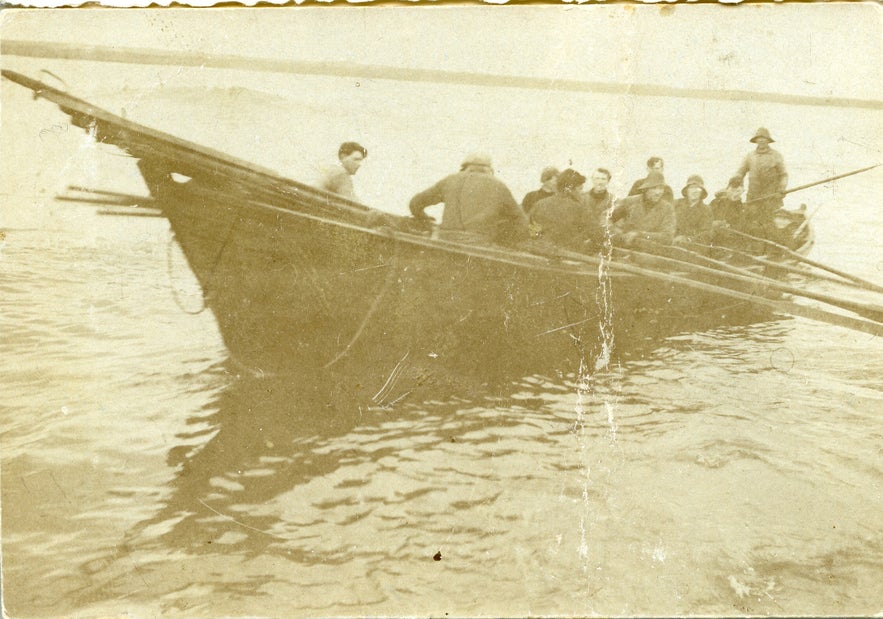
A typical Icelandic rowboat used for fishing, the photo is from the early 20th century.
"Árinni kennir illur ræðari" is a common Icelandic proverb that remains relevant to this day. Its origins reach way back in Iceland's history as a fishing nation. Before the times of trawlers and modern fishing boats, most fishing in Iceland's waters was done on row boats, specifically the so-called "áttæringur" which was a row boat with eight oars. To travel fast across the waves, the rowers needed to be strong and in sync to acquire a decent velocity.
Therefore, a bad rower could really slow down the whole journey. An oar is a pretty simple tool and easy to use, so "blaming the oar" refers to making bad or irrelevant excuses for a poor performance. The oar also appears in another common proverb, "að taka djúpt í árinni," which roughly translates to "pulling the oar with force" and means to exaggerate or overpromise something.
Plight teaches a naked woman to spin
"Neyðin kennir naktri konu að spinna" is a fun Icelandic proverb that uses vivid imagery to put the point across. The meaning of this saying is that, in an emergency, people learn whatever they need to learn to solve their problems. In this case, a naked woman needs to quickly learn to use a spinning wheel to make clothing for herself!
Everyone has their devil to drag
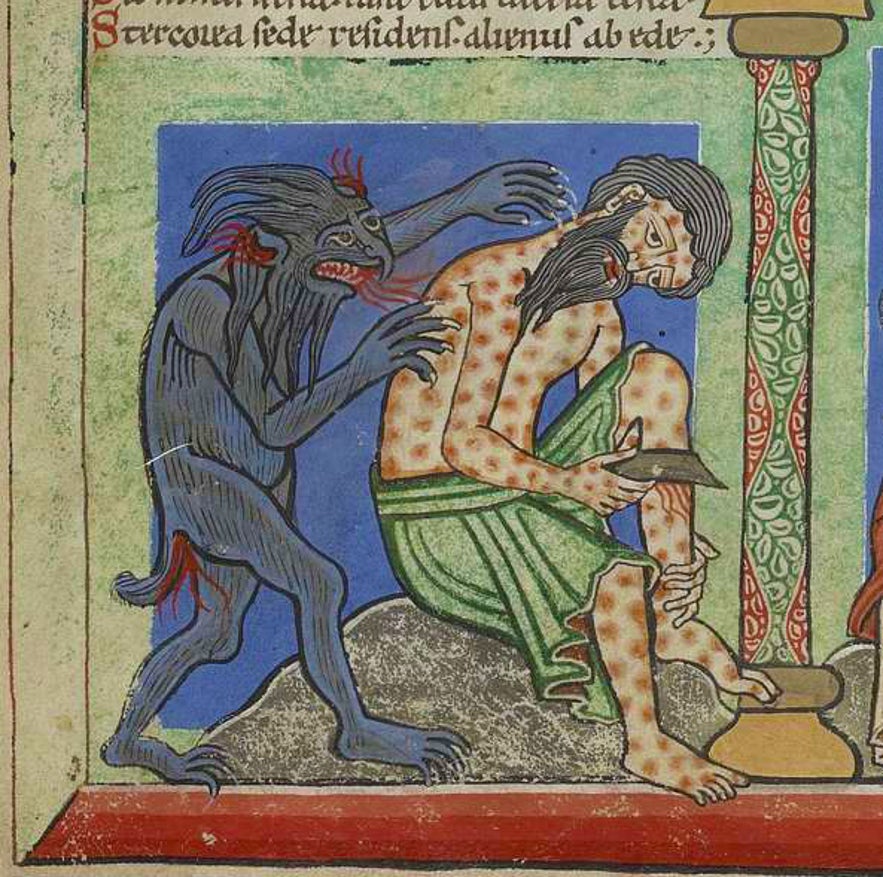 "Hver hefur sinn djöful að draga" is a proverb that reaches back to at least the 18th century, but could be even older. It means that everyone has their problems to deal with, big or small, even though you might not know about it. Interestingly, this proverb has a similar meaning to a common English saying "Everyone has their cross to bear" which refers to Jesus Christ carrying the cross on the way to his crucifixion.
"Hver hefur sinn djöful að draga" is a proverb that reaches back to at least the 18th century, but could be even older. It means that everyone has their problems to deal with, big or small, even though you might not know about it. Interestingly, this proverb has a similar meaning to a common English saying "Everyone has their cross to bear" which refers to Jesus Christ carrying the cross on the way to his crucifixion.
However, in the Icelandic version, it's a lot more devilish! The imagery makes it clear that you can't simply carry or bear the devil, but it's like ol' Satan has his dirty claws buried in you, and you have to drag him across the ground. That's probably a lot harder than carrying a wooden cross!
Distance makes the mountains blue
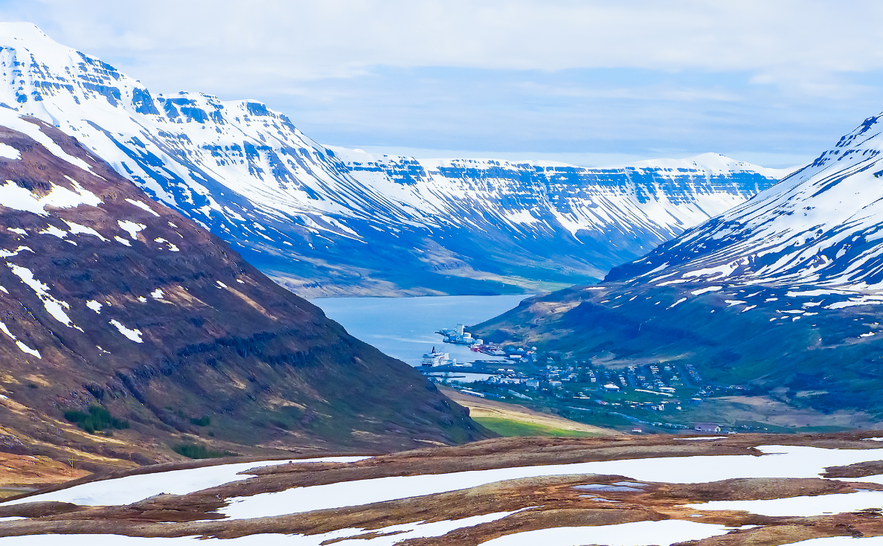
In this photo from Seydisfjordur, you can see how the mountains appear more blue the further they are.
"Fjarlægðin gerir fjöllin blá" is a beautiful Icelandic proverb with a double meaning. When people look at the Icelandic flag, the meaning of the colors might seem obvious to some. The white color represents ice, while the red color represents fire, which makes a lot of sense for a country often called "the land of ice and fire."
Most people then assume that the color blue represents the ocean that surrounds Iceland, but that's incorrect! It actually represents "the mountain blue" or fjallabláminn. When you view the mountains in Iceland from a distance on a clear day, they appear blue. In fact, the further you are, the more blue they appear, which is the literal meaning of this saying.
But metaphorically, it means that the further removed you are from something, the more beautiful it appears in your mind. So when you travel a long way from your home, you start missing it more, or the more time passes from an event, you get more nostalgic about it.
The phrase originates in the play Fjalla-Eyvindur (1911) by Icelandic poet and playwright Jóhann Sigurjónsson. In the original play, the full saying was "distance makes the mountains blue and the men great" which refers to how people can elevate historical figures to greatness with the passing of time.
Icelandic Sayings
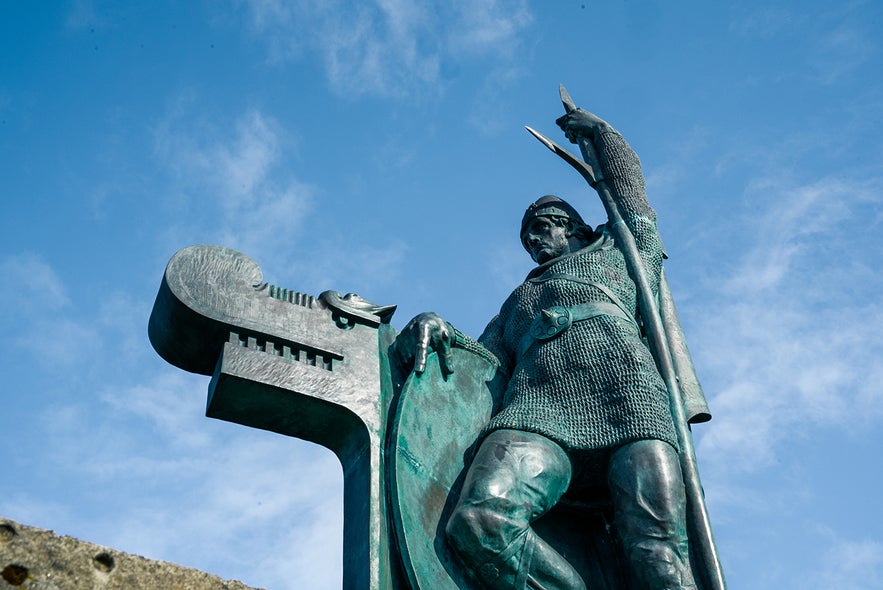 Below, you can read and learn about some of our favorite Icelandic sayings. Now, the difference between a proverb and a saying is quite slight. In this case, we define sayings as a bit more informal phrases that are not quite as profound as a proverb, but no less common in use.
Below, you can read and learn about some of our favorite Icelandic sayings. Now, the difference between a proverb and a saying is quite slight. In this case, we define sayings as a bit more informal phrases that are not quite as profound as a proverb, but no less common in use.
To not call everything grandma
"Að kalla ekki allt ömmu sína" is an Icelandic saying that dates back to at least the 19th century. The origins of the phrase are not clear, but it refers to someone who is tough, unafraid, and not impressed. In the context of the saying, Icelanders, like most people (I hope), are quite respectful and kind towards their grandma. So someone who DOESN'T call everything his grandma, means he's NOT kind towards everything, so that's an obvious tough guy, right? It's a bit hard to explain, but that's the gist of the saying.
Grandmas appear in many Icelandic sayings; a popular one translates to "that's where the devil met his grandma," which appears in a 17th-century poem. It refers to when two people of grand prestige or infamy meet each other, which assumes that the devil's grandma would be formidable to the devil himself.
Foot and webbings were up in the air
A literal interpretation of this Icelandic saying, with a foot and a flipper hanging in the air.
"Uppi varð fótur og fit" is an Icelandic saying that indicates chaos, webbings being the thin skin between the digits on bird feet. The origins of this strange saying are not clear. It kind of gives off the impression of a Warner Bros cartoon "big ball of violence" where human feet and bird feet are swinging wildly in the air during some topsy-turvy event! This phrase is used when there is an uproar among a large group of people or if there is some kind of disorderly behavior or widespread shock.
May all dead fleas now drop from my head
"Detti mér nú allar dauðar lýs úr höfði" is a strange saying that paints quite an image. It is used in situations where one wants to express complete shock. So shocking, in fact, that the dead fleas on one's head seemingly fall off simultaneously, creating a cacophony of dead insects in mid-air. Of course, this is just metaphorical, but it does hammer home the idea that someone is in complete shock over something.
To sit on something like a wyrm on gold
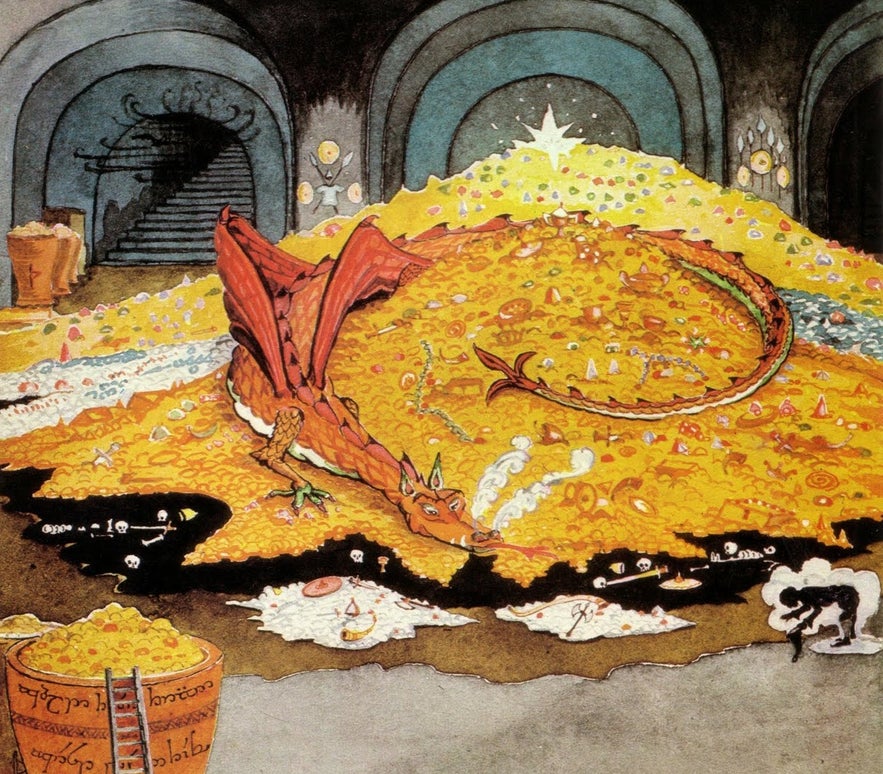
An illustration by J.R.R. Tolkien himself which depicts the dragon Smaug guarding his gold in the Lonely Mountain.
"Að sitja á einhverju eins og ormur á gulli" is a common Icelandic saying that refers to when someone has something and doesn't want to give it away, or someone knows something but doesn't want to say it. The Icelandic word "ormur" usually refers to worms, like ones you might find crawling in the dirt, but in this instance, it refers to a wingless Germanic dragon, or a wyrm.
It is a common motif in Germanic literature to have dragons that hoard treasure and can be found in stories such as "Beowulf" and the "Tale of Ragnar Lodbrok." The best-known example of this motif in modern times can be found in J.R.R. Tolkien's "The Hobbit," a novel that draws inspiration from Germanic literature and the Icelandic sagas, where the dragon Smaug guards the dwarves' gold in the Lonely Mountain.
To strike someone with golden hammers
"Að slá einhverjum gullhamra" is an Icelandic saying that is not as violent as it may appear. In this saying, a golden hammer is a metaphor for a compliment or praise. Therefore, to strike someone with golden hammers means to compliment someone excessively. Sometimes, it's in a platonic sense, but other times, it can mean complimenting someone in a flirty way, hoping for a romantic spark.
To lay beneath furs
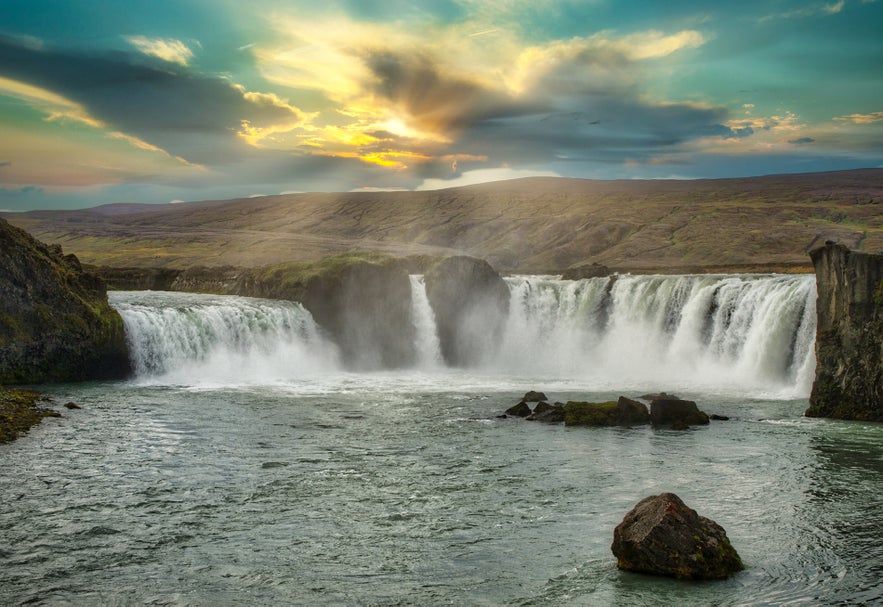 "Að leggjast undir feld" is a simple Icelandic saying with a long history. This saying originates in the year 1000 AD. We know the exact year because it refers to Þorgeir Ljósvetningagoði, who was a lawspeaker in Iceland's Althing from 985 to 1001. At that time, Icelanders mostly worshipped the Old Norse gods, with Þorgeir himself being a pagan priest. When Iceland came under pressure from the Kingdom of Norway to take up Christianity as their religion, Þorgeir decided to lay under a fur blanket for a whole day to think about it.
"Að leggjast undir feld" is a simple Icelandic saying with a long history. This saying originates in the year 1000 AD. We know the exact year because it refers to Þorgeir Ljósvetningagoði, who was a lawspeaker in Iceland's Althing from 985 to 1001. At that time, Icelanders mostly worshipped the Old Norse gods, with Þorgeir himself being a pagan priest. When Iceland came under pressure from the Kingdom of Norway to take up Christianity as their religion, Þorgeir decided to lay under a fur blanket for a whole day to think about it.
He foresaw a terrible civil conflict and perhaps an unwinnable war with Norway if Iceland kept its pagan religion, so he decided that Iceland should take up Christianity as its official religion while pagans would still be allowed to worship the Old Norse gods in private. Therefore, this saying is used when someone needs time to think about a big decision that has huge ramifications, much like Þorgeir did when he lay under his fur blanket.
Another part of this story is when Þorgeir, in an act of religious symbolism, tosses his pagan idols into a waterfall, indicating that the era of the Old Norse gods was coming to an end in Iceland. This waterfall acquired the name Godafoss (as seen above), which translates to the "waterfall of the gods," because of this event and can be visited on this amazing 9-hour North Iceland tour.
These are just few of the many fun and profound Icelandic sayings and proverbs. Which one is your favorite? Will any of these enter your daily lexicon? Tell us in the comments below!
더 많은 흥미로운 게시글

봄 아이슬란드 여행 완벽 가이드
봄은 놀라운 자연의 아름다움을 간직한 아이슬란드를 경험하기에 가장 좋은 시기 중 하나입니다. 오로라부터 철새의 이동까지, 봄은 만물이 소생하는 계절이며 아이슬란드의 모든 것을 탐험하기에 이상적인 시기입니다. 아이슬란드의 봄은 보통 3월에 시작하여 5월까지 지속됩니다. 겨울이 끝나면 아이슬란드는 차갑게 굳어 있던 땅이 녹아내리기 시작합니다. 눈이 녹고,...더 보기
가이드투아이슬란드 VIP 클럽: 완벽 가이드
가이드투아이슬란드의 고객이라면 아이슬란드에서 가장 다양한 투어, 숙박시설, 렌트카를 이용하는 것 뿐만 아니라, 아이슬란드 곳곳의 레스토랑, 바, 상점 등에서 특별 할인 및 독점 혜택을 누릴 수 있습니다! 저희는 항상, 가이드투아이슬란드와 함께 아이슬란드를 방문하는 고객님들의 여행 경비를 절감해 드릴 수 있는 방법을 찾고 있습니다. VIP 회원에게 주어...더 보기
아이슬란드의 골든 서클과 주변 명소 9곳 완벽 가이드
아이슬란드 최고의 관광지 골든 서클(Golden Circle)에 대한 모든 정보를 정리한 글입니다. 온천수가 뿜어져 나오는 간헐천, 우렁찬 소리를 내며 흐르는 거대한 폭포와 두 대륙 사이로 생성된 아름다운 협곡까지 골든 서클의 경이로운 대자연과 주변 명소들을 소개합니다. 골든 서클은 명실상부 아이슬란드에서 가장 인기 있는 여행 코스입니다. 아름다운 대...더 보기

아이슬란드 최대의 여행 마켓플레이스를 전화에 다운로드하여 전체 여행을 한 곳에서 관리하세요
전화 카메라로 이 QR 코드를 스캔하고 표시되는 링크를 누르면 아이슬란드 최대의 여행 마켓플레이스를 주머니에 넣을 수 있답니다. 다운로드 링크가 포함된 SMS 또는 이메일을 받으려면 전화번호 또는 이메일 주소를 추가하세요.










